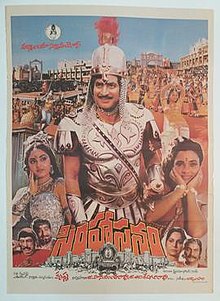Simhasanam (1986 film)
 From Wikipedia the free encyclopedia
From Wikipedia the free encyclopedia
| Simhasanam | |
|---|---|
 Poster | |
| Directed by | Krishna |
| Written by | Krishna |
| Dialogue by | Tripuraneni Maharadhi |
| Produced by | Krishna |
| Starring | Krishna Jaya Prada Radha Mandakini Amjad Khan |
| Cinematography | V. S. R. Swamy |
| Edited by | Krishna |
| Music by | Bappi Lahiri |
Production company | |
Release date |
|
| Country | India |
| Language | Telugu |
Simhasanam (transl. Throne) is a 1986 Indian Telugu-language epic historical film written, directed, edited, and produced by Krishna, who starred alongside Jaya Prada, Radha, and Mandakini. The film was simultaneously made in Hindi as Singhasan. Based on a folklore tale, the film released on 21 March 1986.[1] Simhasanam is the first 70 mm stereophonic sound film in Telugu cinema.
Plot[edit]
Once upon a time, there were two kingdoms, Avanti & Gandhar. Vikram Simha is a gallant Chief Commander of Gandhar ruled by Sharminder Bhupati, who elongates the kingdom from 4 sides. Its princess, Alakananda, endears him. The vicious chief minister, Bherudadamatya, connivances to eliminate the heir, Alakananda, which Vikram senses and safeguards her. However, crafty Bhanu Pratap impeaches Vikram and ostracizes him. Besides, Aditya Vardhan, the prince of Avanti and doppelganger of Vikram, is turned into an abuser by his pernicious mentor Acharya Abhang Deva to chair his son Ugrarahu, the next heir. He also gets intrigued by sculpting a venomous beauty, Chandana, to slay Aditya, and he falls for her. Moreover, Abhang Dev creates mayhem in both kingdoms. Hence, as a countermove, Vikram secretly builds an army and thwarts their felonious. Meanwhile, Sharminder Bhupati announces the crowning ceremony of Alakananda. Being cognizant of it, Abhang Dev accumulates the traitor vassals, and it is uncovered that Abhang Dev & Bhirundamatya are siblings, and they move the pawns. Initially, they heist the prestigious crown of Gandhar and ploy to squat the fort. Vikram checks the conspiracy and accomplishes the celebration when Bherundamatya and the traitors are expelled. Chandana, perceiving herself as a toxin, attempts suicide when Vikram saves and rebounds her. In her absence, Aditya freaks out and wanders. Exploiting it, Abhang Deva seeks to slaughter him, but Vikram shields him. Now, Aditya requests Vikram to deputize his position for annihilating the violations and ameliorating the lifestyles of the public. Vikram obeys and does so by contributing revolutionary changes to the Constitution. Over time, he reinstates Aditya and knits him with Chandana. Abhang Deva bowed a subterfuge here by forging Aditya as an imposter Vikram and sentencing him to death. At last, Vikram hiatuses the rues, ceases the knaves, and defines serenity. Finally, the movie ends on a happy note with the marriage of Vikram Singh & Alakananda.
Cast[edit]
- Krishna as Vikrama Simha and Aditya Vardhana
- Jaya Prada as Princess Alakananda Devi
- Kantha Rao as Maharajah of Dasarna
- Radha as Jaswanthi
- Kaikala Satyanarayana as Rajguru
- Mandakini as Chandana Gandhi / Visha Kanya
- Gummadi Minister of Avanti
- M. Balayya as Army chief of Dasarna
- Prabhakar Reddy as Minister of Dasarna
- Giri Babu as Ugra Rahu Army chief of Avanthi
- Amjad Khan as Bhokkudu
- Pradeep Chandran
Production[edit]
Simhasanam is the directorial debut of Krishna.[2] Principal photography took place at Padmalaya Studios, Hyderabad, along with Hogenakkal and Mysore. The film was shot in 60 days.[3] It is the first 70 mm stereophonic sound film in Telugu cinema.[4][5]
Soundtrack[edit]
The soundtrack was composed by Bappi Lahiri.[6]
| No. | Title | Singer(s) | Length |
|---|---|---|---|
| 1. | "Akasamlo Oka Tara" | Raj Sitaram, P. Susheela | |
| 2. | "Gumma Gumma" | Raj Sitaram, P. Susheela | |
| 3. | "Idhi Kalayani Nenanukona" | Raj Sitaram, P. Susheela | |
| 4. | "Swagatham" | Raj Sitaram, P. Susheela | |
| 5. | "Vahavaee Yavvanam" | Raj Sitaram, P. Susheela | |
| 6. | "Vayyaramantha" | Raj Sitaram, P. Susheela |
Reception[edit]
This was the first film to collect more than ₹1.5 crore in its first week run.[7] It surpassed the record of highest gross collection in a single theatre in the state in Hyderabad.[3]
References[edit]
- ^ "First 70 mm movie completes 30 Glorious years". The Telugu Filmnagar. 21 March 2016. Archived from the original on 10 January 2021. Retrieved 19 June 2020.
- ^ Kavirayani, Suresh (13 September 2017). "Mahesh Babu's Spyder event in Chennai drew bigger turnout than Tamil stars' films?". Deccan Chronicle. Retrieved 14 August 2021.
- ^ a b "మొట్టమొదటి 70ఎం.ఎం. చిత్రానికి 30 ఏళ్ళు!". Samayam (in Telugu). Times Internet. Archived from the original on 8 December 2018. Retrieved 31 December 2020.
- ^ "మూడు పదుల సింహాసనం". Mana Telangana (in Telugu). 20 March 2016. Archived from the original on 10 January 2021. Retrieved 31 December 2020.
- ^ "When romance is a seven-minute duet!". The Hans India. 8 November 2015. Archived from the original on 10 January 2021. Retrieved 19 June 2020.
- ^ "Happy Birthday Bappi Lahiri: Five hit albums in Telugu to celebrate his work". The Times of India. 27 November 2019. Archived from the original on 10 January 2021. Retrieved 19 June 2020.
- ^ "30 Years For Celluloid Wonder Simhasanam". Industryhit.com. 21 March 2016. Retrieved 19 June 2020.
External links[edit]
- Simhasanam at IMDb